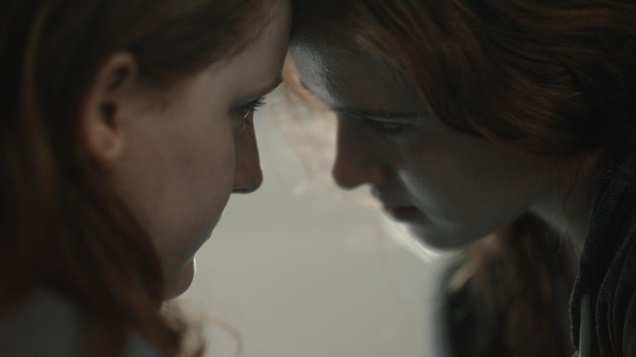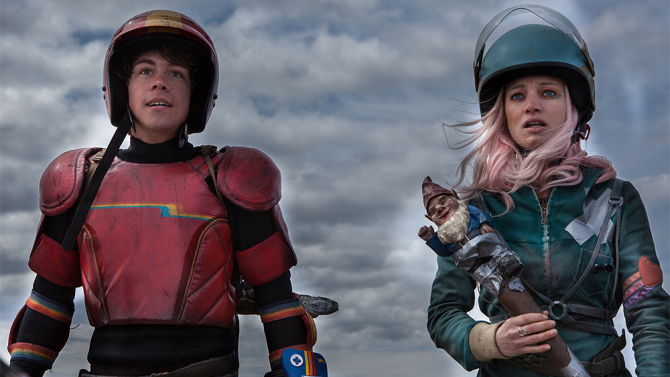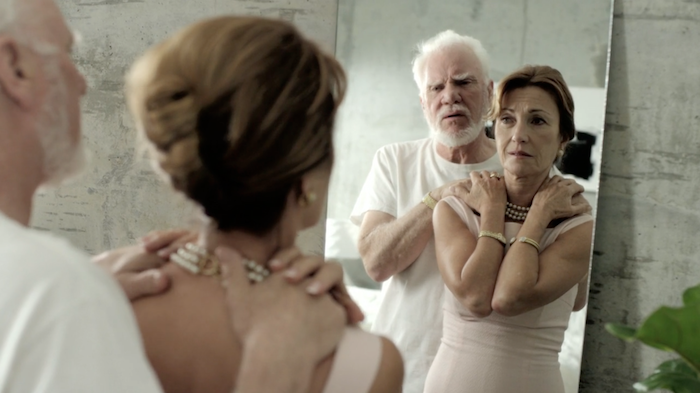THE CRITIC'S CAPSULE: SYDNEY FILM FESTIVAL, VOLUME 2.
 Tuesday, June 9, 2015 at 10:54PM
Tuesday, June 9, 2015 at 10:54PM For Volume 2 of The Critic’s Capsule, SCREEN-SPACE ventures to every corner of the Sydney Film Festival program, presenting our take on a much-loved actress’ latest US indie, a Swedish drama about body issues, a South African documentary on an immortalized text, an insider’s look at Italy’s most famous horse race and a post-apocalyptic vision with BMX bikes…

PALIO (Dir: Cosima Spender / UK, Italy, 92 mins / pictured, above)
In his unbridled account of the Palio - the bareback, city-square horse-riding event that enthralls the population of Italy twice a year - acclaimed documentarian Cosima Spender (Dolce vita africano, 2008; Without Gorky, 2011) captures not only the brutal spectacle of the race but also the essential purity of Italian machismo. Ego, honour, ruthlessness, social stature and courage are both celebrated and brought down a peg or two in this wonderfully entertaining account of the legends who have flown the flags of the competing regions to magnificent highs and crashing lows. As pulse-pounding as the thunderous derby appears on screen, it is the rife corruption and crooked traditions that often prove the most entertaining aspect of Spender’s feature-length debut (a Tribeca best documentary nominee).
You’ll be talking about…: The smug charm of alpha-male Gigi Bruschelli, firm in his belief that a record 14th Palio win is his heaven-sent destiny.
RATING: 4/5
 THE DREAM OF SHAHRAZAD (Dir: Francois Verster / South Africa, Egypt, Jordan, France, The Netherlands, 107 mins / pictured, right)
THE DREAM OF SHAHRAZAD (Dir: Francois Verster / South Africa, Egypt, Jordan, France, The Netherlands, 107 mins / pictured, right)
One of the defining social texts of world literature, The 1001 Nights (aka Arabian Nights) relates the story of the great storyteller Princess Scheherazade, who defied the blade of her lover and king by crafting an endless narrative that would ultimately see her life spared and the monarch humbled. South African director Francois Verster frames a study of swift, often violent socio-political change in the Middle East within a celebration of music, art, performance and the redemptive power of positive creativity. Shot over two years and incorporating such outwardly disparate elements as the Turkish National Youth Orchestra’s staging of Rimsky-Korsakov’s Scheherazade and graphic images from the Arab Spring uprising, Verster considers the legacy of The 1001 Nights while crafting a challenging, vast yet intimate tapestry of personal and cultural significance.
You’ll be talking about…: An Alexandrian actor and a troupe of Cairo-based performers stage readings of testimonies for the martyrs of the January 25 Revolution, written by the mothers of the deceased.
RATING: 4/5
GRANDMA (Dir: Paul Weitz / USA, 78 mins)
Lily Tomlin sets her sights on Oscar glory as Elle Reid in writer/director Paul Weitz’s razor-sharp character-driven comedy/drama, Grandma. Cutting a tart-mouthed swathe through the upscale gay and intellectual enclaves of LA in her search for the $630 needed to help her granddaughter Sage (Julia Warner, finally finding a worthy vehicle for her talents), Tomlins’ lesbian-poet-misanthrope reps a tour-de-force role. Having been cast aside by the LA suits after back-to-back duds Being Flynn and Admission, Weitz reconnects with the smart, sweet, caustic voice that highlighted his best work (About a Boy; In Good Company).
You’ll be talking about…: Tomlin, of course, but also the marquee-worthy support cast – Marcia Gay Harden, John Cho, Judy Greer, Don McManus, Nat Wolff, a terrific Sam Elliott and the late Elizabeth Pena.
RATING: 4/5
 MY SKINNY SISTER (Dir: Sanna Lenken / Sweden, Germany, 95 mins / pictured, right)
MY SKINNY SISTER (Dir: Sanna Lenken / Sweden, Germany, 95 mins / pictured, right)
Few films have tackled the early-teen sororal dynamic with the insight and empathy of first-time writer-director Sanna Lenken’s My Skinny Sister. Taken for granted by tuned-out parents (Annika Hallin, Henrik Norlen), youngest daughter Stella (the remarkable Rebecka Josephson) idolises her figure-skater big sis Katja (Amy Deasismont, an dead-ringer for Hailee Steinfeld); the family begins to implode when Stella, herself struggling with early body-issue concerns and the first flushes of romantic desire, discovers Katja is in the throes of bulimia. No surprise that Lenken was once a sufferer and has previously explored the impact of the disease in the short Eating Lunch; there is barely a false note in her slow-burn drama. Despite some unnecessary third act melodrama, My Skinny Sister is, in every other respect, a warm-hearted, quietly powerful work.
You’ll be talking about…: The bathroom scene, where Stella is filled with concern when she discovers Katja is purging, only to have Katja hold the crush Stella has for the ice-skating coach over her little sister in exchange for secrecy. Josephson and Deasismont (aka, Swedish pop starlet Amy Diamond) are both extraordinary in their bigscreen debuts.
RATING: 3.5/5
 TURBO KID (Dirs: Francois Simard, Anouk Whissell, Yoan-Karl Whissell / New Zealand, Canada, 95 mins / pictured, right)
TURBO KID (Dirs: Francois Simard, Anouk Whissell, Yoan-Karl Whissell / New Zealand, Canada, 95 mins / pictured, right)
Turbo Kid has been touted as a loving nod to those dusty VHS rentals that faded on the outer rims of rental shelves with names like 1990: The Bronx Warriors and Exterminators of The Year 3000. An outland BMX-er named ‘The Kid’ (an ok Munro Chambers) takes on the guise of his comicbook hero, Turbo Kid, to thwart the henchmen of bloodthirsty post-apocalyptic dictator, Zeus (Michael Ironside, enjoying himself). It should be a blast, but this Kiwi/Canuck hybrid oozes an icky hipster-cool smugness that impresses itself by ridiculing the genre’s shortcomings rather than celebrating the unshakeable integrity of the no-budget action epic. The gags feel like cheap shots, rarely earning a laugh. DOP Jean-Philippe Bernier’s widescreen frame and crisp imaging actually work against the comedic premise, as does the CGI-amped splatter-effects. EP Jason Eisener nailed the 80s send-up/homage with far greater skill as director of Hobo With a Shotgun (2011).
You’ll be talking about…: The wonderful Laurence Leboeuf as comic-relief robo-babe Apple. If the film finds its audience (that under 25, ‘the 80s were so daggy and funny’ crowd), expect Apple cosplayers to populate the Cons.
RATING: 2.5/5
Visit the Sydney Film Festival website for all ticketing and venue information.
 Independent,
Independent,  Lili Tomlin,
Lili Tomlin,  Palio,
Palio,  Sydney Film Festival
Sydney Film Festival 



